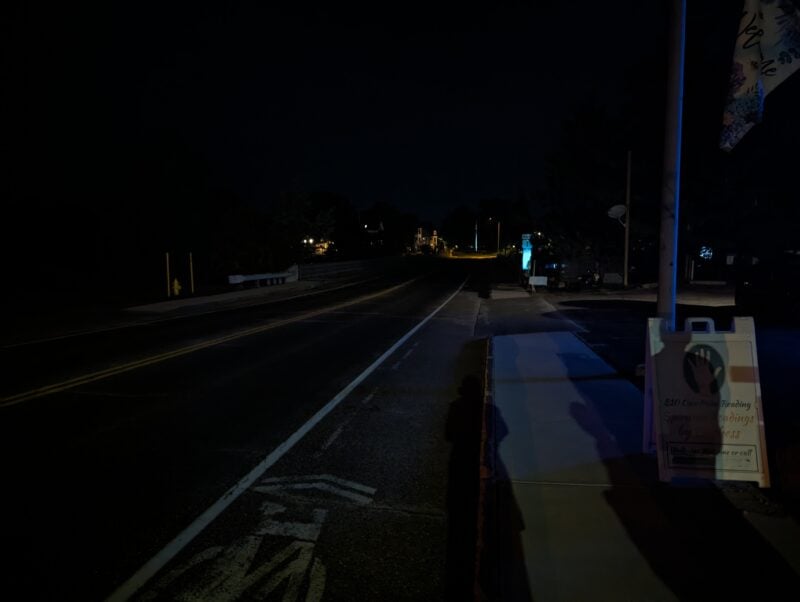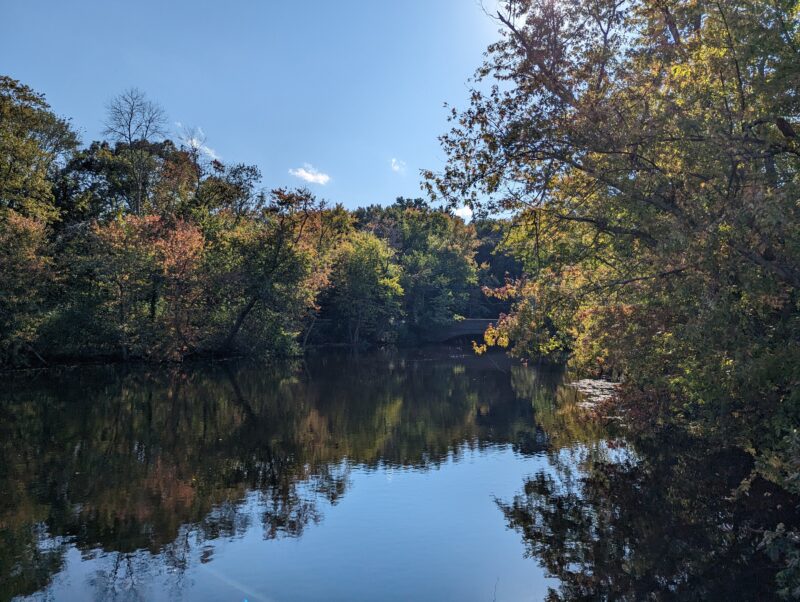
walking into the MEng by Alan Z. '23, MEng '24
thoughts about a 63-mile trek
This past Sunday, at 4 AM on the side of U.S. Highway 1 on Badger’s Island in Maine, along with Nathan S. ’25 and Jonathan H. ’25, I took my first steps on a 63-mile walk from Maine to Next House, an Odyssey which would take us 22.5 hours, crossing three states01 I mean, we were in Maine for about 20 minutes, but I still think it counts. and stopping at least five McDonald’s; a tragedy that would cost us 125,000 steps and probably gallons of water, during which we lost Jonathan at mile 32 to some hip flexor concerns02 o7. he's alright now, fortunately. as well as our collective sanity. We trekked down trails and up the sides of roads, through the heat of the mid-afternoon to the darkness of Highway 1 in the evening, until, finally, at 2:50 AM, we stumbled through the doors of Next House, limping, barely able to continue walking. It took me two or three days just to be able to walk normally again.
There are lots of things I could tell you about this walk. I could tell you that this walk reminded me of the power of perseverance; that, a lot of the times, when it plays out in real life, the story of the tortoise and the hare is more about the tortoise’s ability to keep going rather than the hare’s perceived laziness. I could tell you that getting through MIT is like that—the journey is long, and it’s not about going as fast as you can, but instead making it as far as you can. It’s about building up the stamina and mental capacity and just plodding your way down the side of the highway, one step after another.
I could also tell you that the walk taught me the importance of “knowing your limits” and “listening to your body”; that we should’ve quit at mile 54 when things started hurting and the project became much less interesting, that suffering just to say you’ve done something is almost never worth it. I could tell you that you need to engineer escape plans which you know you will take, because your decision-making skills are weakest exactly when you are tired and under stress, that is, when you need to make the decision to quit. I could also tell you that getting through MIT is like this—it’s very easy to see something interesting, decide to do it, and then refuse to quit even though it’s no longer fun and it’s hurting your ability to actually enjoy your college experience at all.
Those stories are important, but, in a sense, they’re both oversold—the truth, I think, is unsatisfying: the balance between perseverance and self-care is one that we need to find for ourselves, a kind of an Aristotelian mean which we are always seeking, a question to which there is no right answer except the one which allows you to achieve fulfillment.03 by this I mean that intangible thing we sometimes call "happiness"—not pleasure, but a complete kind of happiness that can weather difficult storms, what Aristotle causes "eudamonia." Sometimes, it is possible to just keep pushing through and have it turn out great; other times, you would’ve been much better off taking a break, or dropping a class, or quitting that activity you don’t put enough time into anyway. The answer, as it often is, is that two things can be true at once.
So, instead, let’s rewind a bit.
As you may know, I graduated from the Institute last spring, with an SB04 trivia: MIT only offers Bachelor of Science degrees, which means that all degrees are SBs. in Writing and Computer Science and Engineering. I’m back now, writing as I pursue a MEng in computer science,05 as you may have noticed from the blogger name. MEng, by the way, stands for Master of Engineering. which means I’m now a graduate student.06 *shudders*
And it’s different, and it’s the same. I’m living in a graduate dorm now, which is still a dorm, but I have my own bedroom for the first time in years.07 this was by choice, to be clear; there are lots of singles available at MIT, particularly for upperclassmen. during my junior and senior year of undergrad, I chose to live in a double, because I really liked having a person I couldn't avoid checking in with. I’m a graduate teaching assistant now, but many of my responsibilities are the same ones I did as an undergraduate lab assistant—staffing office hours, giving lab check-offs, etc.. I’m trying to navigate this weird, liminal space where I feel like I am neither a true graduate student nor a true undergraduate student—in other words, a moment of transition.
Where does this walk fit into all that?
In many ways, this walk felt like the last gasp of undergrad for me. So much of my undergraduate experience was defined by proving myself to nobody in particular—proving I could do anything and everything, doing dumb, insane things just for the hell of it. I need to finish these 63 miles because then I will be able to say that I am capable of doing it, just like I used to say I need to take all these classes because then I will have learned so much more about all the things I want to know about. This is not to say that I regret how I spent my undergrad, but rather that it is a modality of living which is slowly coming to an end, and this felt like one last manifestation of that spontaneous, do-it-all lifestyle.
But this was also the first time in years where I had the time and energy for a project like this, especially in the week between REX08 Residential EXploration, where first-year students get to explore all the dorms with a <em>lot</em> of fun events. REX is run entirely by student volunteers, from top to bottom, which for a long time included me, in various capacities. and the first day of classes. I’ve always been so busy, running from activity to activity, or, during the semester, living from problem set to problem set, that I never really got to slow down and focus on any one thing. In this sense, the walk felt like graduate school: narrowing my life down to specific, larger projects which have particular meaning—research, TAing, etc.—instead of doing six classes and a dozen activities. I wanted to go on a long walk, and so I dedicated a day to preparing for it, a day to doing it, and a day to recovering from it, and everything was good.
And, honestly, that narrowing is exciting to me. I am excited to see what is possible when I actually get to put more time into fewer baskets, what is possible when I get to take a little more time to recover from things and celebrate small victories, instead of moving on to the next battle. If the walk is anything to judge by, it’ll be fun, chaotic, intentional, maybe a little difficult and painful, but it just might be good yet. It will be finally choosing depth over breadth, as I prune the tree of possible paths towards some future, and, for the first time in my life, I feel ready to do that.
So, the walk was a great idea, or maybe the walk was a terrible idea, and maybe it was a good time, and maybe it was a bad time, but whatever it was, it felt like part of this turning point, from the past to the future, from undergrad to grad, from the widening to the narrowing, and that was good.
So, we’ll see. Maybe these thoughts are just a kind of start-of-term optimism, which is always abundant, or maybe this MEng will be a genuine turning point in my relationship with work, its depth and breadth, and what I want to do next. I’ve got a few semesters left to find out.
- I mean, we were in Maine for about 20 minutes, but I still think it counts. back to text ↑
- o7. he's alright now, fortunately. back to text ↑
- by this I mean that intangible thing we sometimes call "happiness"—not pleasure, but a complete kind of happiness that can weather difficult storms, what Aristotle causes "eudamonia. back to text ↑
- trivia: MIT only offers Bachelor of Science degrees, which means that all degrees are SBs. back to text ↑
- as you may have noticed from the blogger name. MEng, by the way, stands for Master of Engineering. back to text ↑
- *shudders* back to text ↑
- this was by choice, to be clear; there are lots of singles available at MIT, particularly for upperclassmen. during my junior and senior year of undergrad, I chose to live in a double, because I really liked having a person I couldn't avoid checking in with. back to text ↑
- Residential EXploration, where first-year students get to explore all the dorms with a lot of fun events. REX is run entirely by student volunteers, from top to bottom, which for a long time included me, in various capacities. back to text ↑



